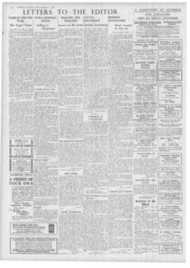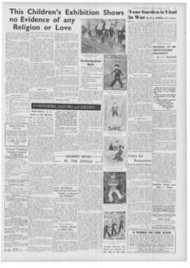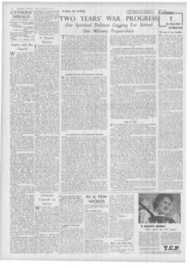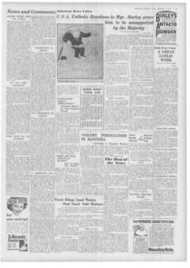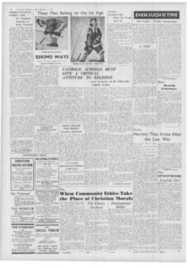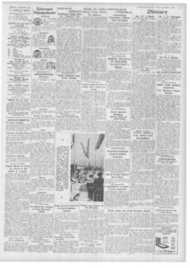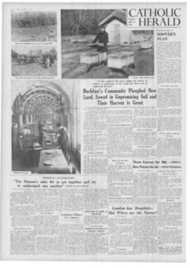Page 8, 5th September 1941
Page 8

Report an error
Noticed an error on this page?If you've noticed an error in this article please click here to report it.
Tags
Share
Related articles
An Enthusiastic Beginner Could
Your Garden Is Vital
Tackling Britain's Land
Your Garden Is Vital In War
Monk Builders Of Prinknash Learn Art Of Stone Chipping
Buckfast's Community Ploughed New Land, Sowed in Unpromising Soil and Their Harvest is Great
If the needs of the place oblige the monks to labour at gathering in the crops. let them not be saddened thereat."
Hands that were mole used to pen and typewriter gicw hardened with spade and pitchfoils and I think that a few backs ached and one niember of the community at least wants to have a heart-to-heart talk with theorists who it in art air-conditiotaid office and write about " Back to the land !"
" It's All Very Well . . ."
It's all very well for Catholic editors and Hilaire Belloc," he said to me. " Let them try it for a hit!" " But," I assured him. " The editor of the CATHOLIC HERALD really does roll his sleeves up. and stab the earth with spade and hoc. In feet. he is often heard murmuring about buying a farm." Ah r said the brother sceptically.
" And get someone else to work it. A gentlemen farmer !" The Editor, when I told him. said he wished this Brother could see him in his garden at week-ends.
Changes at Buckfast
War has brought many changes to Buckfast. Eight acres alone are sown with potatoes.
The bets clover crop honey is already being prepared for the market and Brother Adam has transported the four hundred hives (with sonic help from the brethren) out to the moorland where they will extract the honey from the heather and an yield the delicious September " heather crop."
The cider presses are busy—contrary to general impression, beer is not made at Buckfast—and the famous wine will continue to be made until the exigencies of war prevent the materials coming into the country.
So it has been increased activity all round of the monastery's usual activities. But the outside world has surged and broken against the walls and the monks have gone out to do rescue work and to send out rescuels, too.
School Found a Home There
Since war began the Catholic community has more than trebled in the country round about. The three churches—Buckfast, Ashburton and South Brent all have vastly increased congregations and the monastery has opened its doors to the evacuated boys from Gravesend. When Plymouth was homhed the Christian Brothers' school of St. lioniface—the only boys' secondary school in the diocese—was given sanctuary.
This was a big work or salvage, for without Buckfast's timely help the school was in grave danger of tieing broken up aitogether. Now about a hundred of the boys are being looked after, together with their Christian Brother teachers and they have been able to follow their ordinary curriculum without interruption. They did their schools and higher schools certificate examinations this summer which were, in fact, actually held in the monastery.
To help house the school the monks have given up their Chapter Room and many of the other rooms have been made into classrooms.
Black-out—the Only Concession
The tea gardens which many visitors of peace-time will remember, now house a school run by the Sisters of Mercy and the guest house has been full with a waiting list for over a year.
There are changes, too, in the Abbey, hut the only concession the monks have made to the Hitler menace have been to do the necessary black-out and to take down the famous retable of gold relief from the high altar and to lodge it against the stout ninthcentury wall of the original Anglo-Saxon church on the site of which the Abbey is built.
" It would take more than llitler's bombs to shake that," said the Father editor of the Chronicle.
As for the black-out, it has had a curious effect on the interior of the Abbey. As you look down the nave you see that the sandstone arches have taken on an ice-blue shade that contrasts strangely with the red
sandstone vaulting. The design is sharpened and enhanced, and the whole perspective is oddly fascinating.
When the Bishop was Bombed
If the Apostolic Delegate had made his official visit to Buckfast Abbey in peacetime he would have heard the famous peal of hells, but now bells are for a more sinister purpose than calling people to church.
When the Bishop of Plymouth was bombed out of his &lute some of the monks at Buckfasz went to Plymouth and helped to salvage Ins possessions. Some of these have been lodg.,d in the monastery,
Yes. The war has conic to Buckfast Abbey and its evil has been transmuted into good. laairen soil has been made fertile; into the ample shade and shelter of the monastery have been gathered school-less youth; refugees from bombs have come to Protestant Devon and have found the consolations of their religion waiting for them.
Monks as Chaplains
Five of the community have gone out into the world again and are acting as chaplains to the Forces, and among Chem is the former editor of the Clieonie/e.
But side by side with these corporal works of mercy the monastic life goes on uninterruptedly. Buck fast Abbey is still the only place in England where Mass is sung every day of the year and the full liturgy of the Church is carried out with, as the Chronicle says, " all cam and splendour."
Not one mixed marriage in its entire history of 92 years is the record of St. Nicholas' parish in Dacada, Wis., U.S.A. Decada is so small that its name seldom appears on a map, but St. Nicholas' parish, which now numbers 140 families. has given 26 priests and 35 nuns to the Church.
blog comments powered by Disqus



